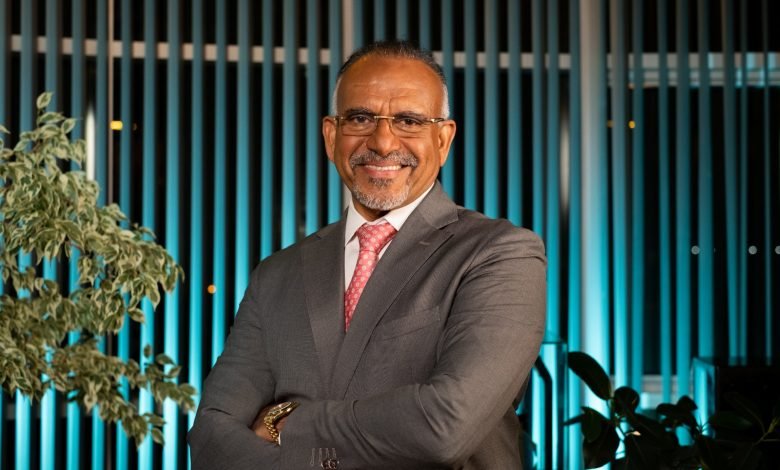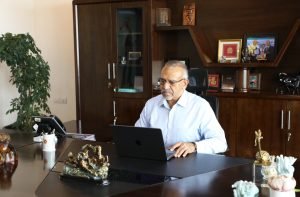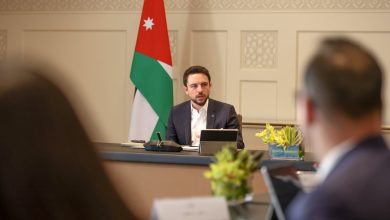
By : Nedal Zubeidi
Jordan Daily – In a remarkable journey of ambition and success, an Indian accountant, who once headed the Revenue Department of Bombay Airport, has made a name for himself in the Middle East’s garment industry.
Mr. Sanal Kumar, Chairman and Managing Director of Classic Fashion Apparel Industry Ltd. Co., Jordan, began his journey in 1991 when he moved to Dubai to work as a finance manager in a garment factory. His keen understanding of the business led him to believe that he could run the operation more effectively.
After completing a three-year contract with the company, he started setting up garment businesses for investors across the Middle East, including in Dubai, Qatar, Abu Dhabi, and Oman.
In 2000, he expanded his operations to Jordan, setting up a plant in Ad-Dulayl Industrial Park for Emirati businessman who was having a garment factory in Abu Dhabi. The move came before the Free Trade Agreement of 2000 between Jordan and the U.S , and during the period of the Qualifying Industrial Zones (QIZ) agreement in 1997.
The businessman fell in love with Jordan and decided to make it his home. He credits the positive life, the people, and the bureaucracy of the country for his decision.
In 2003, the Indian businessman, who had been working and saving for 14 years, managed to accumulate $500,000. Embodying the Indian ethos of saving for the future, he decided to invest his hard-earned money into a business venture.
He chose Al-Hassan Industrial Estate in Jordan for his venture, primarily due to financial constraints.
With a budget of $600,000, which is modest sum for setting up a garment factory, he engaged a local contractor named Omar to convert the warehouse into a factory. Omar, who had known the entrepreneur for three years, agreed to a payment plan involving three post-dated checks to be cashed at certain dates upon completion of the factory.
The entrepreneur also needed machinery for his factory. He approached Ahmad Nashif, a Syrian national who dealt in such machines. Despite not having the funds to pay upfront, he proposed a similar payment plan to Ahmad, offering post-dated checks to be cashed later. Ahmad, who had known the entrepreneur since 1996, agreed to the terms and supplied the machines.
In 2003, he used his savings of $500,000 to start a subcontracting business in the garment industry. Due to lack of funds to buy fabric, he arranged for his customers to place orders with another factory, which would finance the fabric and other materials. He would then cut and make the garments at his facility in Alhassan Industrial Estate, Jordan, and started shipping the goods to the customer.
He secured a $2,000,000 credit line with Standard Chartered Bank in the year of 2004. He had 2 production lines and 300 employees by then, which helped him to generate a business turnover of USD 2,000,000.

Fast forward to 2023, his business has grown significantly. He now operates 324 production lines with a workforce of more than 32,000 employees, 6,000 of whom are Jordanians. The rest of his employees come from various parts of the world, including India, Bangladesh, Nepal, Sri lanka, Pakistan , China, Syria , Palestine, Turkey and U.S.A
He owns 22 factories across Jordan, including 12 in Al Hassan Industrial Estate, two in Aqaba, 8 factories in the various governorates of Jordan namely 1 in Jerash, 2 in Ajloun(Anjara and Junaid) , 1 in Jordan Valley, 2 in Karak (Fagua and Moab) , 2 in Tafila ( Alruwaim and Buseirah) .In addition to these 8 factories, 2 more are coming in the next 18-24 months, 1 in Judeida and 1 in Al quweyrah. Additionally, he has setup a state of art mill in Mafraq which will create another 1600 job for the Jordanians in the coming 2 years. This impressive expansion showcases his entrepreneurial spirit and commitment to the garment industry.
Mr. Sanal Kumar expanded his business across Jordan in the rural areas of Jordan to support Jordanian in those areas for whom commuting otherwise is a limitation. The inspiration for creating all the factories in rural areas (satellite Units) came from His Majesty’s call to create such factories for needy Jordanians. These factories helped to create job for the people in the villages instead of expecting them to travel to industrial zones.
These satellite units are connected to the main operation in Al-Hassan Industrial Estate and enjoy the same status. Currently, there are 8 such units across the country, employing over 5000 Jordanians. Additionally, 1000 Jordanians work in the Al -Hassan Industrial Estate itself, bringing the total number of Jordanian employees to 6000. In addition to these 8 factory, Classic fashion is committed to creating 2 more factories in Judeida and al-quweyra in the next 18-24 months which will create another 1,600 jobs for Jordanian in these areas. This strategy showcases his commitment to providing employment opportunities to locals and contributing to the Jordanian economy.
He noted that the company currently holds approximately 50% share of a $2 billion industry. It has achieved nearly $1 billion in revenue. In 2022, it reported sales of $954 million. Although the company experienced a downturn in 2023, it had initially projected to reach $1 billion in turnover by 2024. Despite the challenging year, which affected not just Jordan but the entire world. ” We are optimistic about our growth. If we don’t hit the $1 billion mark in 2024, we are confident we will surpass it in 2025,” Mr. Kumar noted.
The company’s growth has been substantial, expanding from just 300 employees to 32,000, and from 1-2 production lines to 324, across 22 factories. “This expansion wasn’t easy; we’ve weathered many storms, including tsunamis, typhoons, cyclones, and thunderstorms. However, with 34 years of experience in this industry, we’ve learned the importance of patience and the right strategy. We know how to navigate through tough times without being overly aggressive and to capitalize when conditions improve. This resilience and adaptability have been key to our success.”
Classic Fashion, now exports products to the United States and Europe, collaborating with prominent brands such as Under Armour, Adidas, Gap, American Eagle, Abercrombie, as well as retail giants like Walmart, Target, and JCPenney. This partnership network highlights its significant role in the global retail supply chain.
Mr. Sanal Kumar firmly believes in the ethos of sustainable business. To him, money beyond basic needs is merely a number. “Profit is essential for a business’s survival,” but it’s not the be-all and end-all, he says. He is committed to not pursuing profit at the cost of others’ welfare. “I strive for an inclusive environment where everyone can lead a decent life,” he asserts.
For him, sustainability is non-negotiable as it safeguards the community, employees, and suppliers from potential harm. He rejects any business practices that compromise these principles. Mr. Kumar believes that “true happiness stems from being content with what we have, not from chasing material wealth.”
He holds that this form of happiness is enduring and immune to external influences.

